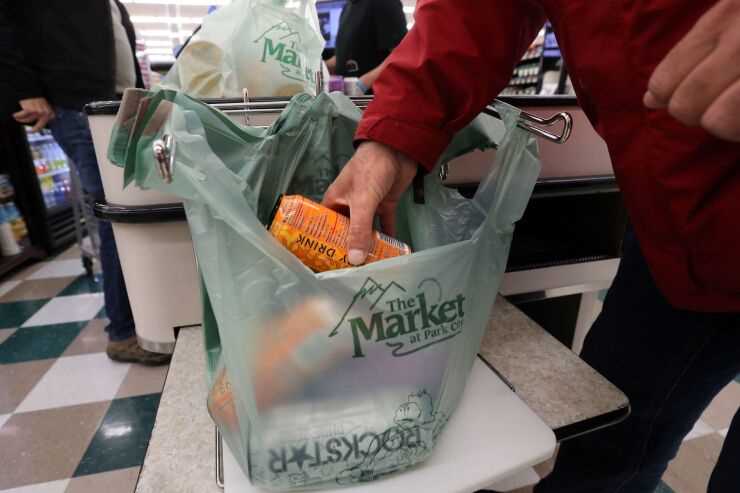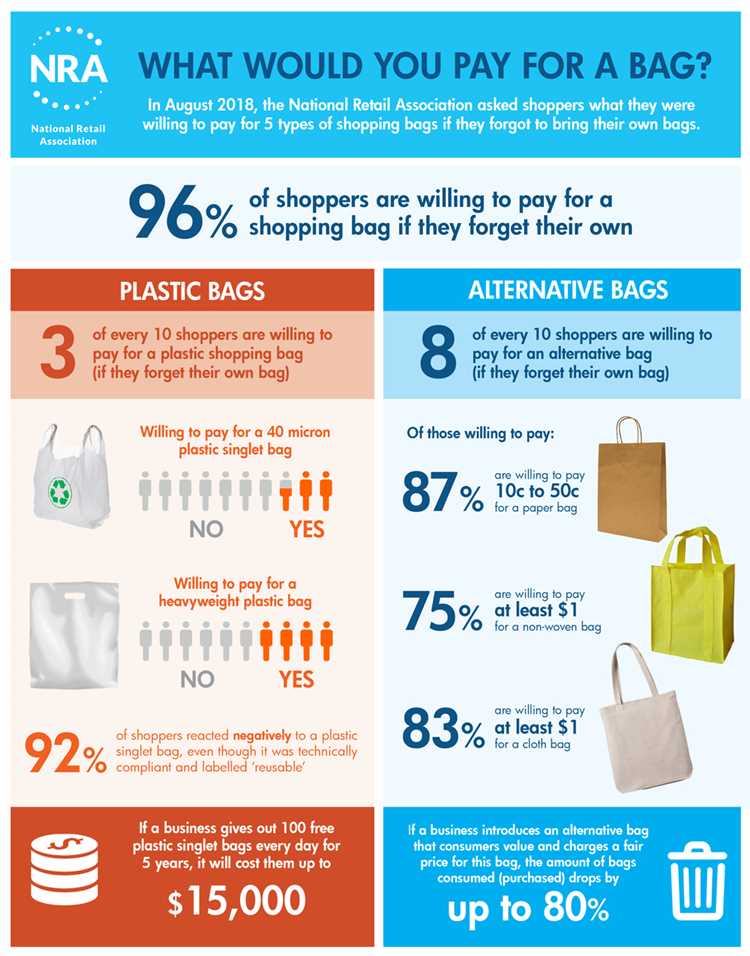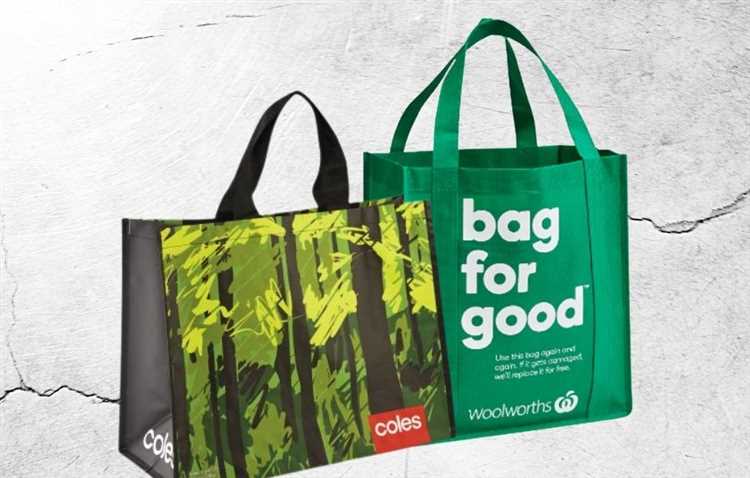
In recent years, there has been an increasing push to reduce the environmental impact of plastic shopping bags. One proposed solution is to charge customers for these bags, encouraging them to bring their own reusable options instead. But is this approach effective, and should we really be paying for shopping bags?
Firstly, the environmental impact of plastic shopping bags cannot be ignored. These bags are often used once and then discarded, contributing to the growing problem of plastic waste in our oceans and landfills. By charging customers for these bags, it creates an incentive to bring their own reusable alternatives, reducing the overall demand for single-use plastic.
Furthermore, the financial implications of paying for shopping bags can be a deterrent for customers. When faced with the choice of paying for a bag or bringing their own, many individuals may choose to opt for the latter. This not only saves them money in the long run, but it also encourages a shift in consumer behavior towards more sustainable practices.
However, there are also arguments against paying for shopping bags. Some argue that it unfairly targets low-income individuals who may not be able to afford reusable options. Additionally, there are concerns that charging for bags may simply become an additional revenue stream for retailers, rather than an effective measure to reduce plastic waste.
In conclusion, the question of whether we should pay for shopping bags is a complex one. While it can be an effective way to reduce plastic waste and encourage more sustainable practices, it is important to consider the potential impact on low-income individuals and ensure that the additional charges are being used for environmental initiatives. Ultimately, a combination of education, awareness, and alternative solutions may be the most effective approach to reducing our reliance on single-use plastic bags.
- The Environmental Impact of Shopping Bags
- The Problem with Plastic Bags
- The Benefits of Reusable Bags
- Alternatives to Plastic Shopping Bags
- The Cost of Providing Shopping Bags
- Arguments in Favor of Paying for Shopping Bags
- Reducing Environmental Impact
- Encouraging Sustainable Habits
- The Benefits of Charging for Shopping Bags
- Public Opinion on Paying for Shopping Bags
- Supporters of Paying for Shopping Bags
- Opponents of Paying for Shopping Bags
- undefined
- Why should we pay for shopping bags?
- Will paying for shopping bags benefit the environment?
- What are the disadvantages of paying for shopping bags?
- Is paying for shopping bags a fair approach?
The Environmental Impact of Shopping Bags

Shopping bags have become a common feature of our daily lives, but their environmental impact is often overlooked. Despite their convenience, there are several reasons why we should pay more attention to the use of shopping bags and consider making changes to our current practices.
The Problem with Plastic Bags
One of the main concerns with shopping bags is the widespread use of plastic bags. These bags are made from non-renewable resources, such as oil, and have a significant environmental impact. Plastic bags can take hundreds of years to break down, and in the process, they release harmful toxins into the environment.
Furthermore, plastic bags are a major source of pollution in our oceans. They often end up in water bodies, where they harm marine life. Many marine animals mistake plastic bags for food, leading to entanglement and ingestion, which can be fatal.
The Benefits of Reusable Bags
One way to reduce the environmental impact of shopping bags is to promote the use of reusable bags. These bags are made from durable materials, such as cotton or canvas, which can withstand multiple uses. By using reusable bags, we can significantly reduce the amount of waste generated from shopping bags.
Reusable bags also have the potential to save energy and resources. Unlike plastic bags, which need to be manufactured from scratch for each use, reusable bags can be used repeatedly, reducing the demand for new bags. This, in turn, decreases the extraction of raw materials and the energy required for production.
In addition to their environmental benefits, reusable bags can also save consumers money in the long run. Many retailers offer incentives for using reusable bags, such as discounts or rewards. By bringing our own bags, we can save on the cost of purchasing single-use bags every time we shop.
Conclusion
The environmental impact of shopping bags, particularly plastic bags, cannot be underestimated. By switching to reusable bags, we can help reduce pollution, conserve resources, and protect marine life. While it may require some initial effort and adjustment, the long-term benefits are well worth it. It is time for us to rethink our use of shopping bags and make sustainable choices for the sake of our planet.
Alternatives to Plastic Shopping Bags
As the negative environmental impact of plastic bags becomes increasingly apparent, more and more people are looking for alternatives to minimize their use. There are several options available that can help reduce plastic waste and promote sustainability:
- Reusable Shopping Bags: These bags are made from durable materials such as canvas, nylon, or recycled materials. They are designed to be used multiple times and can carry heavy loads, making them a great alternative to single-use plastic bags.
- Paper Bags: While paper bags come from a renewable resource, they have their own environmental impacts. However, they can be recycled or composted, making them a more eco-friendly option compared to plastic bags.
- Biodegradable Bags: Made from materials that can decompose over time, biodegradable bags are designed to break down naturally without leaving harmful residues. However, it is important to note that they require specific conditions to degrade properly.
- Cloth Bags: Cloth bags are a popular alternative, especially for small purchases. They are lightweight, foldable, and can be easily stored in a purse or pocket. They can also be customized with various designs or logos.
- Mesh Produce Bags: These lightweight and breathable bags are perfect for carrying fruits and vegetables. They eliminate the need for plastic produce bags and can be washed and reused multiple times.
By opting for these alternatives, individuals can reduce their reliance on plastic bags and contribute to a more sustainable future.
The Cost of Providing Shopping Bags
When it comes to shopping bags, there are often hidden costs that many consumers may not be aware of. Retailers typically provide shopping bags for free, but these bags come at a cost to both the environment and the businesses themselves.
From an environmental perspective, the production and disposal of shopping bags can have a significant impact. Most shopping bags are made from materials such as plastic or paper, both of which have negative consequences for the environment. Plastic bags, for example, contribute to pollution and can take hundreds of years to break down. Paper bags require cutting down trees and can also contribute to deforestation.
Aside from the environmental impact, providing shopping bags also incurs costs for businesses. The production and distribution of bags requires resources such as materials, energy, and labor. These costs are ultimately passed on to the consumer in the form of higher prices for goods and services. Retailers also have to deal with the logistics of storing and managing bags, which can be time-consuming and expensive.
Some argue that charging for shopping bags can help offset these costs and encourage consumers to bring their own reusable bags. By charging for bags, retailers can generate revenue to cover the expenses associated with providing bags while also incentivizing customers to be more environmentally conscious. This can lead to a reduction in the overall use of shopping bags, which in turn can have a positive impact on the environment.
However, others argue that charging for shopping bags can be seen as an additional burden on consumers, particularly those on lower incomes. They argue that it is unfair to expect everyone to have access to reusable bags and that charging for bags may disproportionately affect certain demographics. There is also concern that charging for bags could lead to an increase in the use of alternative materials, such as single-use plastics, which can be even more harmful to the environment.
In conclusion, while providing shopping bags for free may seem like a convenience, it is important to consider the hidden costs associated with this practice. By charging for shopping bags, retailers can help offset these costs and encourage more sustainable practices. However, it is crucial to find a balance that takes into account both environmental and social considerations.
Arguments in Favor of Paying for Shopping Bags

There are several compelling arguments in favor of implementing a fee for shopping bags. These arguments are centered around environmental, economic, and social benefits.
Reducing Environmental Impact

The most commonly cited reason for implementing a fee for shopping bags is to reduce the environmental impact of plastic bags. Plastic bags are a major source of pollution, as they take hundreds of years to decompose and often end up in oceans and landfills.
By charging a fee for shopping bags, consumers are encouraged to bring their own reusable bags and reduce their reliance on single-use plastics. This can significantly decrease the production and consumption of plastic bags, ultimately reducing environmental pollution.
Encouraging Sustainable Habits
Implementing a fee for shopping bags also helps to promote sustainable habits and responsible consumer behavior. By making consumers pay for bags, they are incentivized to consider alternatives such as reusable bags or minimizing their use of bags altogether.
This shift in behavior can extend beyond just shopping bags and lead to a more mindful approach to consumption in general. Encouraging individuals to think about the environmental impact of their choices can help to foster a more sustainable and conscious society.
| Benefits of Paying for Shopping Bags: |
|---|
| Reduces environmental pollution |
| Encourages responsible consumer behavior |
| Promotes the use of reusable bags |
| Fosters a more sustainable society |
In conclusion, implementing a fee for shopping bags has numerous advantages. It reduces environmental pollution, encourages responsible consumer behavior, promotes the use of reusable bags, and fosters a more sustainable society. By paying for shopping bags, individuals can contribute to a cleaner and more environmentally friendly future.
The Benefits of Charging for Shopping Bags

1. Reducing Single-Use Plastic Waste:
Charging for shopping bags has proven to be an effective measure in reducing the use of single-use plastic bags. By imposing a charge, it encourages consumers to bring their own reusable bags, which significantly reduces the demand for plastic bags. As a result, this helps in reducing plastic waste and the environmental impact associated with their production and disposal.
2. Encouraging Sustainable Behavior:
When consumers are required to pay for shopping bags, it creates a financial incentive for them to adopt more sustainable behavior. People are more likely to think twice and consider whether they really need to use a bag or if they can manage without one. This leads to increased awareness and consciousness about their consumption patterns, which can extend to other aspects of their lives as well.
3. Saving Resources:
The production of shopping bags requires the consumption of valuable resources such as energy, water, and raw materials. By reducing the demand for plastic bags through charging, it helps in conserving these resources. Additionally, it also reduces the carbon emissions associated with the production, transportation, and disposal of bags.
4. Supporting Local Communities:
When stores charge for shopping bags, it can be an additional source of revenue for them. This revenue can be reinvested to support local communities, such as funding environmental initiatives or community projects. It can also help businesses offset the costs of providing environmentally-friendly alternatives, such as promoting the use of reusable bags and providing incentives for customers to bring their own.
5. Shifting Consumer Habits:
The introduction of a charge for shopping bags can serve as a catalyst for changing consumer habits. It encourages individuals to rethink their consumption patterns and consider more sustainable alternatives. This shift in mindset can extend beyond just shopping bags and lead to individuals adopting a more sustainable lifestyle overall, making more conscious and environmentally-friendly choices in their everyday lives.
In conclusion, charging for shopping bags brings several benefits, including reducing plastic waste, encouraging sustainable behavior, saving resources, supporting local communities, and shifting consumer habits. By implementing this measure, we can contribute towards a more sustainable and environmentally-friendly future.
Public Opinion on Paying for Shopping Bags
As the movement towards reducing single-use plastic becomes increasingly important, the question of whether or not we should pay for shopping bags has gained significant attention. The topic has generated a wide range of opinions among the public, with arguments for and against the implementation of bag fees or taxes.
Supporters of Paying for Shopping Bags
Many individuals and organizations believe that implementing a fee for shopping bags is an effective way to reduce plastic waste. They argue that by charging for bags, people will be more likely to bring their own reusable bags, leading to a decrease in the demand for plastic bags. This decrease would ultimately help to minimize the environmental impact of these bags, as they often end up in landfills or pollute natural ecosystems.
Supporters also argue that the cost of implementing a bag fee is relatively low compared to the potential benefits. These benefits include reducing litter, conserving resources, and improving overall environmental sustainability. Some studies have shown that bag fees have proven to be successful in reducing plastic bag consumption in various cities and countries around the world.
Opponents of Paying for Shopping Bags
On the other hand, there are those who oppose the idea of charging for shopping bags. Some argue that bag fees unfairly burden low-income individuals who may not be able to afford reusable bags. This could lead to negative social implications, as it may create a barrier for certain people to access essential goods.
Opponents also argue that bag fees may not necessarily lead to a significant reduction in plastic bag consumption. They claim that people may opt to pay for bags despite the fee, which would result in businesses profiting from the implementation of the fee rather than achieving the intended environmental goals.
| Pros | Cons |
|---|---|
| Effective in reducing plastic waste | Potential burden on low-income individuals |
| Encourages the use of reusable bags | Possible lack of significant reduction in bag consumption |
| Low cost in relation to potential benefits | Potential for businesses to profit from the fee |
In conclusion, the public opinion on paying for shopping bags is divided. While some argue that bag fees are an effective solution to reduce plastic waste and promote sustainability, others raise concerns about the potential negative impact on low-income individuals and the overall effectiveness of such fees. It is clear that further research and open dialogue are necessary to find the most appropriate and balanced approach to reducing our reliance on single-use plastic bags.
undefined
Why should we pay for shopping bags?
There are several reasons why we should pay for shopping bags. Firstly, it helps to reduce plastic waste and promote sustainability. By charging for bags, people are encouraged to bring their own reusable bags, which helps to reduce the amount of plastic being used and discarded. Secondly, it can help to offset the costs associated with providing bags in the first place. Stores often provide bags for free, but they come with a cost, both financially and environmentally. By charging for bags, stores can cover some of these costs. Lastly, it can act as a deterrent to excessive bag usage. When people have to pay for bags, they are more likely to think twice about how many bags they really need, which helps to reduce unnecessary waste.
Will paying for shopping bags benefit the environment?
Yes, paying for shopping bags can benefit the environment. By charging for bags, it encourages people to bring their own reusable bags, which reduces the amount of plastic waste being generated. Plastic bags take hundreds of years to break down and can cause harm to wildlife and ecosystems. By reducing the use of plastic bags, we can help protect our environment and reduce pollution. Additionally, charging for bags can also help promote sustainability and raise awareness about the importance of using reusable alternatives.
What are the disadvantages of paying for shopping bags?
While there are benefits to paying for shopping bags, there are also some disadvantages to consider. One disadvantage is the potential burden it places on low-income individuals. For those on a tight budget, paying for bags can be an added expense that they may struggle to afford. Another potential disadvantage is the inconvenience of having to remember to bring reusable bags. If you forget your bags when you go shopping, you may have to either purchase bags or carry your items without any bags, which can be difficult. Lastly, there is also the risk that people may switch to alternative types of single-use bags, such as paper bags, which also have environmental impacts.
Is paying for shopping bags a fair approach?
The fairness of paying for shopping bags can be subjective and depend on individual perspectives. Some may argue that it is fair because it encourages people to take responsibility for their consumption and reduce waste. It also helps to offset the costs associated with providing bags. Others may argue that it is unfair to place the burden of environmental responsibility on consumers, especially those who may be financially disadvantaged. The fairness of the approach may also depend on how the funds collected from bag charges are used. If the money is reinvested in environmental initiatives or used to support low-income individuals, it may be seen as a fairer approach.